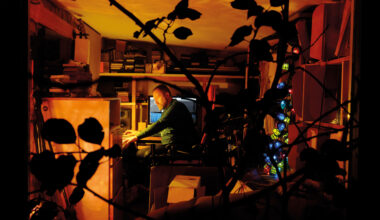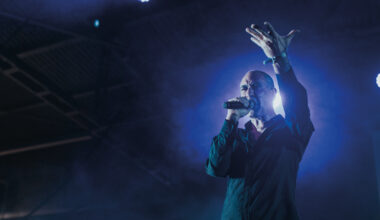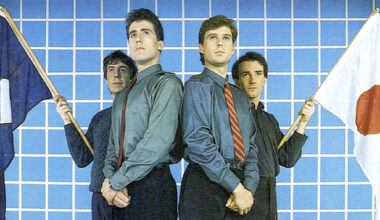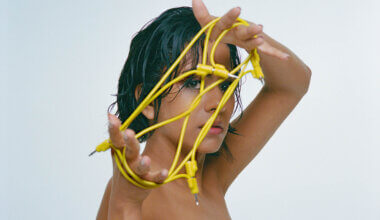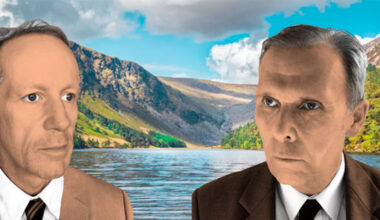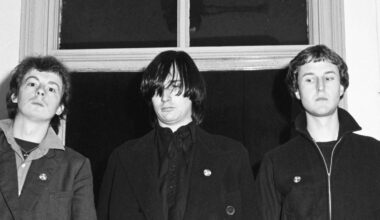From the classical pomp of The Proms to the thrilling pop of her new album ‘Varmints’, Anna Meredith is shaking up preconceptions about composers and turning ideas of what a songwriter is on its head
“If someone asks what I do and I can’t be bothered I’ll just say ‘I’m a musician’, if I really want to shut it down I’ll say ‘I’m a teacher’, but the honest answer would be ‘I’m a composer’.”
Meet Anna Meredith. She’s a composer.
“But people often think composer means a conductor and they do the miming, and you say, ‘No no, that’s a conductor, I write music’. ‘Anything I’ve have heard of?’. ‘I doubt it’. ‘Oh, so stuff for people on “X Factor”?’. ‘No, no, more like orchestras…’. ‘Like Beethoven?’, ‘Kind of like that’. By the time you get that far you wish you’d just said you were a teacher.”
We’re waiting to be served in a faux-rustic coffee shop in Hackney. Not all that long ago this would’ve been like wandering into the deep-dark woods. Today, it is the height of frou-frou, full of mewling babies and pushchairs scattered like confetti. It’s late afternoon and, with the imminent release of her debut album, ‘Varmints’, Anna Meredith has been on promotional duty over the road and she’s starving. In front of us at the counter, a young mum is informed the kitchen is in fact closed. “But,” she stutters, incredulous, “your website says it’s open all day.” How to explain that the kitchen ain’t going to open because it says so online?
In a world which has all but conceded that the internet is indeed some sort of panopticon that holds the solution to everything if you hit your keyboard hard enough, Anna Meredith will come as a very welcome discovery. There’s a quote from Scottish daily newspaper, The Herald, that describes her as “one of the UK’s most visible composers”. They have a point. Being creative is often a lonely pursuit, but what Anna does is so physical, so big and bold and loud and fun that you could reach out and touch it.
“I’m quite a people person,” she says, parked at a table scoffing a posh sandwich (might’ve been carrot and rocket) from the counter (kitchen was closed, see). “I’m not somebody who loves slaving away on their own. Normally you’ll hand the score over to someone else and you sit there freaking out while they play your piece. I wanted to have a bit more fun and enjoy performing.”
The oldest of three children, Anna Meredith was born in London where her dad was a journalist for The Financial Times, her mum completing a post-graduate degree in painting conservation. When Anna was two, they decamped to Edinburgh when her dad became the FT’s Scotland correspondent. There wasn’t much of a soundtrack in the home, it was more of a Radio 4 type of house, but the same cassette tapes were played obsessively in the car (Paul Simon’s ‘Graceland’… Sibelius). So when Anna began learning violin in primary school it was because everybody else did.
“I wasn’t one of the cool kids,” she says. “So music was a social thing, especially when I got to high school, then it became a saviour. I didn’t really know what to do with myself so I started learning clarinet and found there was this amazing structure. I could do orchestra, windband, choir… I had something to do every night after school and the people were a bit geekier, a bit more like me.”
Pop music started to seep in, Blur and indie, Nirvana and grunge.
“I began learning drums,” she says, “played in a couple of bands and started to go to a few gigs… Teenage Fanclub or Kingmaker or The Posies, but I’m also listening to Tchaikovsky and Shostakovitch and playing in orchestras. Sitting in a symphony orchestra is an amazing feeling, not just getting inside the music, but having that shared experience, especially when something dramatic is happening, 60 people all working to make this powerful piece of music.”
All of which led to studying Music at York University, followed by a Masters at The Royal College Of Music in London, where she also became a junior fellow. Already quite the CV.
“It doesn’t feel especially impressive, because all my mates did exactly the same thing,” says Anna. “The Royal College is just a place, full of geeks, with its own problems.”
Like where to live. When you’re studying in South Kensington, living round the corner isn’t an option for mere mortals.
“So you try and find somewhere cheap to live,” laughs Anna. “A mate of mine found this amazing place called Camberwell, so we all moved in nearby.”
Post-college, the friends formed the Camberwell Composers Collective and would put on occasional gigs in the local jazz club.
“We’d play these short pieces, they’d just be little experiments,” she says. “So there was one where we all played children’s xylophones and one where we played with bass guitar feedback on an amp. We did loads, just ideas, and we’d present them to our audience and then get pissed and have a disco afterwards. It was all quite irreverent, which was nice because contemporary classical music can seem quite serious, quite academic. We were giving each other the confidence to experiment and for that be okay.”
So where did the desire to get involved in electronic music come from?
“The thing with contemporary classical music,” she explains, “is a lot of the power is with other people. You’re waiting for a commission, ‘Will you write for this orchestra? Will you write for this string quartet?’. I had so much training and expertise in classical music, but I wanted to do something else as well as music for other people. I’ve always liked trashy dance music and Ibiza anthems. I like dancing about, I’ve never been a massive clubber, but I have always liked the sound of that late-90s Josh Wink era of dance music.”

Makes sense then that her first electronic dabblings involved a bassoon and a guitar distortion pedal.
“That was a Camberwell Collective piece,” she says. “The idea of something not sounding how it looks is always quite interesting. I’ve played that piece to kids and been like ‘Check. It. Out.’ and they just say, ‘It sounds like guitar’. ‘Yeah, but it’s a bassoon!’. And they’re like, ‘What does a bassoon sound like?’.”
Heavy metal guitar soloing squall one minute, debut EP on the very excellent Moshi Moshi label the next…
“I’d written a few pieces and had some EPs made up, but I didn’t know what to do with them,” admits Anna. “So I sent it to some people and nobody got back to me. I think someone played ‘Nautilus’ to Stephen [Bass, Moshi co-founder] and we met up.”
Opening her 2012 debut EP, ‘Black Prince Fury’, the epic ‘Nautilus’ also kicks off the new album. It is as bold a statement as you’d want to make. Brass piled on brass, repeating over and over, like some sort of techno national anthem. But there’s not a scrap of actual real-life brass in sight, which throws up an argument Anna’s heard 100 times before. Why synthesise when you could actually score it?
“I didn’t have the facilities to record a brass ensemble,” she says, frankly. “Does it matter? It totally doesn’t matter whether it’s analogue synths or a preset or a real instrument, you do what makes the material work. I’ve seen so many concerts with incredible programme notes about what the piece is about: ‘I took every third second of this and an algorithm of that and I did a spectral analysis of the sound of my fridge’. But if the piece sounds shit, what’s the point? I love the sound of brass, so why not make it do-able for yourself? It’s a bit crude, but I don’t really care, it’s the brass I can work with and most people think it’s real anyway. I’ve tried not to worry about it because that’s not what my music is about.”
So what is her music about?
“I’ve never wanted to alienate or try and appear like ‘You’ll never get this, it’s too academic’,” she offers. “My music is meant to be joyful and bonkers and energising and fun. It makes me laugh when I listen to it. There’s a bit in ‘The Vapours’ on the album, this kind of oompah bassline, and I just laughed my head off the whole way through.”
And so to the album, then. ‘Varmints’. An interesting title that.
“I thought everyone knew what varmints were,” says Anna. “They’re pests, like vermin. They’re musical pests, ideas that have infected my writing in different respects over the last 15 years. I’ve been thinking about this record for a looong time.”
The interesting titles don’t stop with ‘Varmints’. There’s ‘Scrimshaw’, which is delicate carving in bone or ivory, ‘Dowager’, a widow who holds title or property from her deceased husband, ‘Shill’, the accomplice of a confidence trickster…
“The titles are like one-word programme notes,” she says. “They give you a little insight into the piece, which you can then ignore, but it’s nice to offer a toe in the door to what you’re trying to say.”
Interesting, a shill? Is that how she feels?
“I think you do feel like a bit of a fraud at times,” she says. “That was definitely the case when I started doing electronics. I’ve been thinking about it for a long time, probably 10 years, so even though the songs might have been written more recently, the techniques and the energies that shape the songs have been building up to this point.”
Get the print magazine bundled with limited edition, exclusive vinyl releases
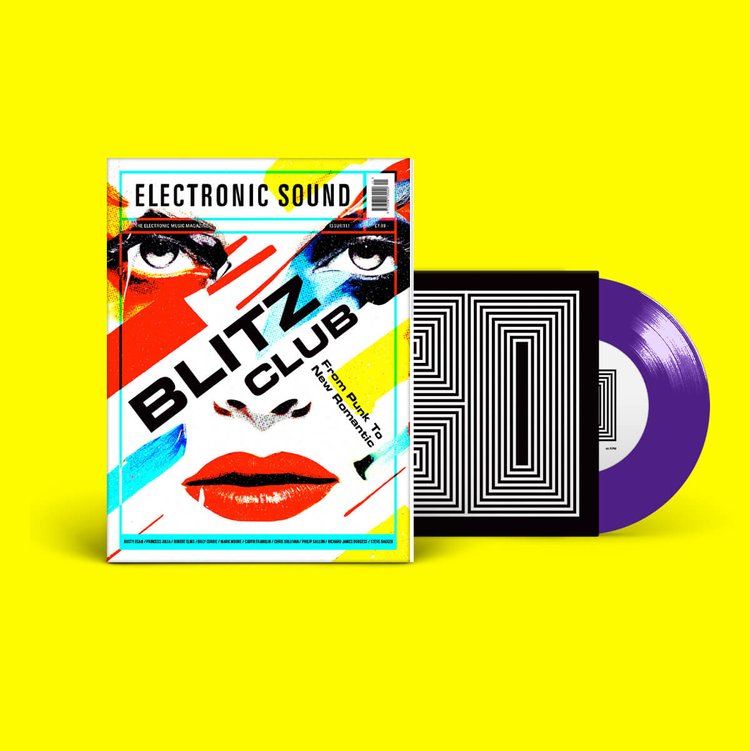
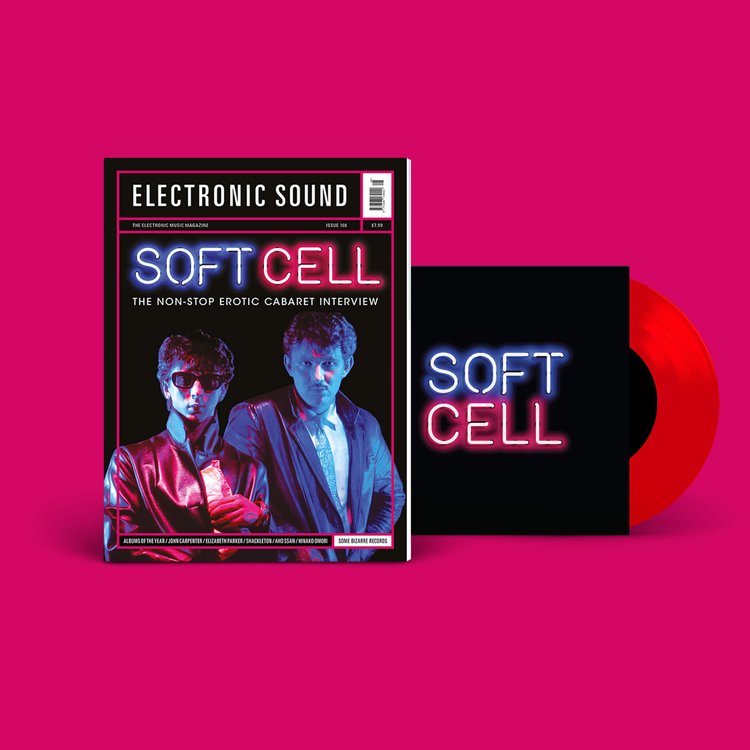
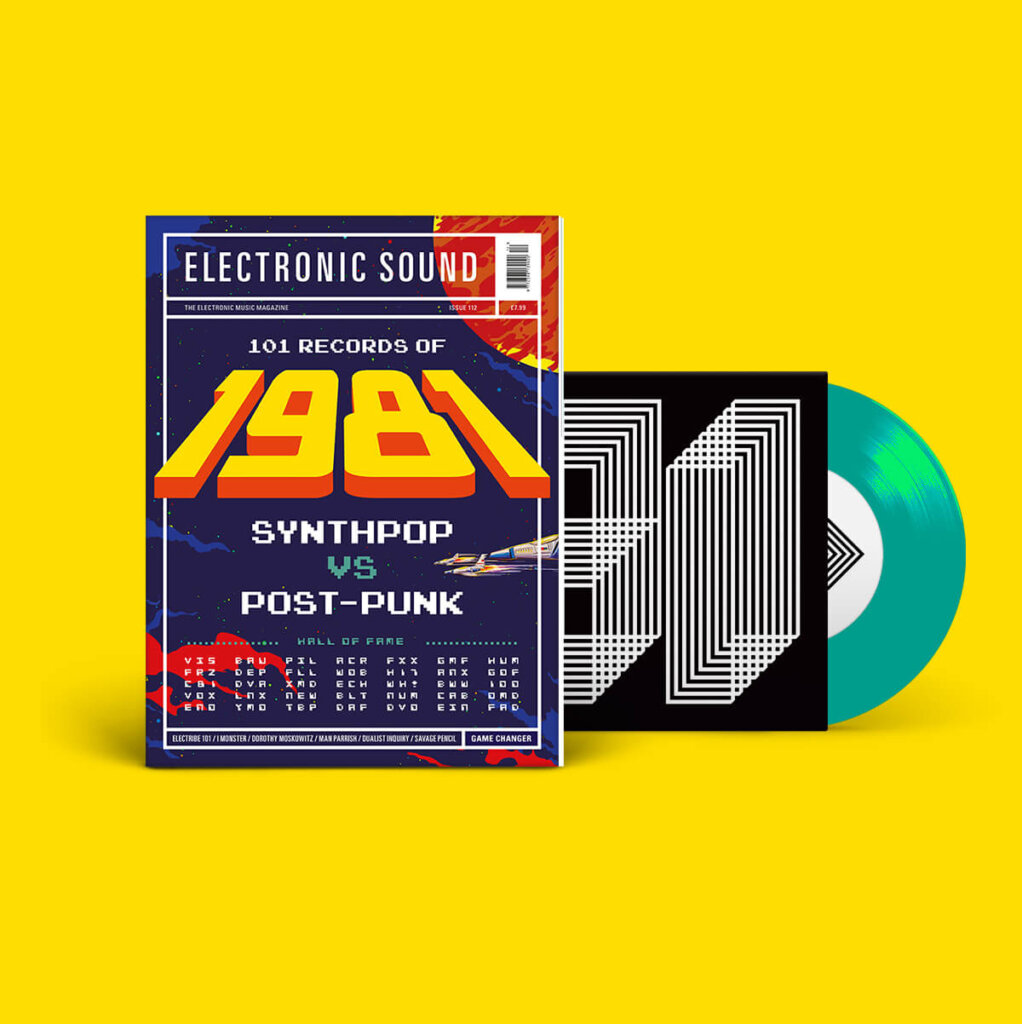
The whole album is brimful with kicks. ‘Dowager’ builds from sleepy synth strings into a euphoric choral swirl with a chorus to kill for. There’s ‘Taken’, a track that arpeggios like Frankie Knuckle’s ‘Your Love’ with Pixies guitar riffola spinning off all over the place, there’s the house-y chops of ‘Something Helpful’, where the likes of Stereolab or Saint Etienne or Dubstar shimmer into view. Oh yeah, were you expecting some deviously impenetrable modern classical whatnot? Nope. ‘Varmints’ is a clever, bold, confident pop record.
“Oh right,” says Anna, a little wrong-footed. “I haven’t tried ever to say, ‘Now I’m going to write a pop song’, it would end up crap if I ever tried to reference something. I’ve realised quite recently that I don’t listen to much music, I find it too distracting. It sounds awful, but I’m not very curious, but I do like setting myself very small technical challenges though. I’ve always wanted to do a ‘Yeah’ chorus, so ‘Taken’ has one, but I didn’t set out saying I want to write a pop song, so…”
There’s a device borrowed heavily by electronic music from the classical world that is very much at home in both circles. Arpeggios. And they’re everywhere on ‘Varmints’.
“I do love an arpeggio,” she smiles. “Quite often people will say to me, ‘Your stuff is like Philip Glass’. I love Philip Glass, but his work is static and mine has always got a direction.”
And that direction tends to be upwards, piling stuff on other stuff and then more stuff on that until it gathers into a huge storm cloud of sound. The technique even has a name among her pals – The Meredith Build.
Album in the bag and about to be unleashed, all she needs now is a band to play all of this stuff live. Which she has. Of course.
“It’s a bit of a side-project for some of my classically-trained mates,” laughs Anna. “There’s two cellos, a tuba, electric guitar, drums and me on clarinet and there’s a laptop, oh and there’s some drums for me too. It’s like going back to that teenage orchestra thing, I’ve missed that so much. When I first stated doing this it was just me and a laptop. The first EP had no instruments and the second [2013’s ‘Jet Black Raider’] had a couple, and this album has got loads of instruments. It’s also about what the band members can all bring. I found out Sam, my drummer, has an amazing voice so he sings the main vocal on ‘Dowager’. And I knew they’d all be up for something really hard to play, so ‘Shill’ is an absolute roaster.”
Anna even lends a vocal or two of her own on the record.
“It’s an accountability thing,” she affirms. “There’s not some bloke behind the scenes doing the production and bringing in a better singer. I know I’ve not got the best voice, but I want this to be my baby. I want to be represented by it, I feel proud of it, really proud of it. That’s why there’s no one else doing the arranging and production. If people criticise it, they are criticising me, you can’t be, ‘Well, I didn’t write this stuff’. It is pretty personal.”
‘Blackfriars’, an instrumental that closes ‘Varmints’, is exactly that. Pretty personal.
“It was written at a slightly different time to the rest,” explains Anna. “Things were a bit shitter in my life at that point. Normally I try to get my myself into a ‘Come on, let’s go’ state in order to feel confident with the writing, but I couldn’t psyche myself up. The album’s unusual in that nobody was asking for it, but my day-to-day is about deadlines and I had to write this piece for a Radio 4 documentary, so I tried to tap into my vulnerability. It wasn’t that I had to get the emotion out, but…”
Never really considered it before, but is the ‘William Tell Overture’ about anything? Do composers make work that is about something in the way pop songs can about something? Anyway. ‘Blackfriars’ is a beautiful piece, the straightest composition on the whole record, but it is quite unsettling, its slow, mournful string sweeps punctuated with an insistent tap-tap-tap, a heartbeat perhaps.
“It’s a cello bow tapping,” says Anna. “We thought it needed this little tick.”
Back then to where we came in. When someone asks her what she does, on the strength of ‘Varmints’, is she a composer or a songwriter?
“It means exactly the same thing,” she says, quick as a flash. “Part of the reason I didn’t give myself a band name or a project name is I wanted it to feel part of the whole umbrella of who I am and what I do. I think it’s all about the big picture rather than getting obsessed with the little detail, the nuance. The way I approach writing is exactly the same, I use the same method whether I’m writing for laptop or for kids or for symphony orchestra or an opera. There’s defiant similarities in all the music I do, all I try and do is just chuck myself into the world of whatever it is I’m doing.”
‘Varmints’ is out on Moshi Moshi

